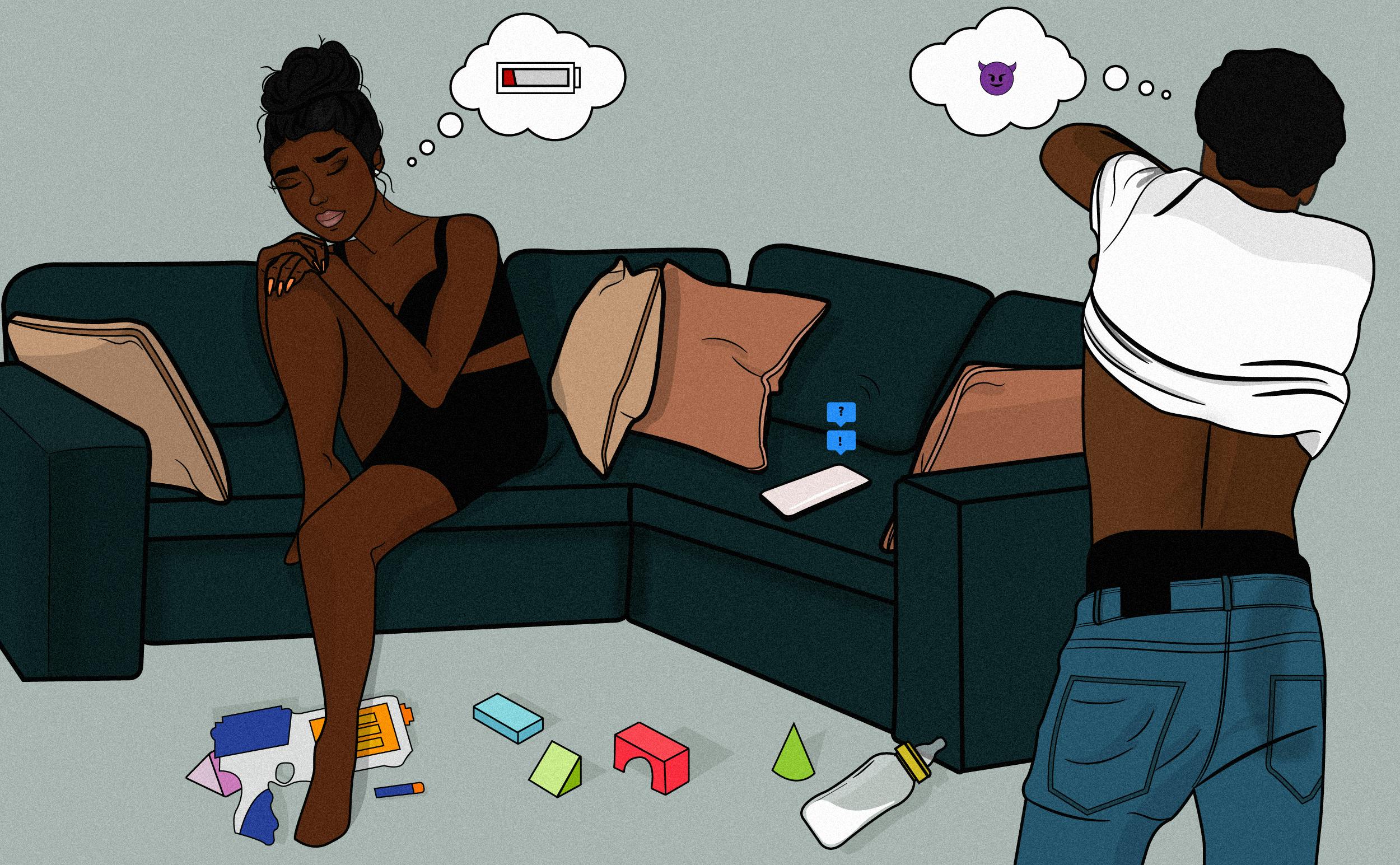A Strong Relationship and Great Sex in Trying Times
A Strong Relationship and Great Sex in Trying Times
Psychologist and certified sex therapist Dr. Ari Tuckman discusses how anxiety, depression, and medical problems can impact a couple’s relationship and sex life and how they can work together to get things back on track.
In a relationship, whatever affects one partner also affects the other. This can be something positive, like when the couple shares the joy of one partner’s promotion at work. It can also be something negative, like when one partner has a sick parent and both partners need to deal with the fall-out. In relationships, our life satisfactions are intertwined—we gain someone to celebrate with as well as support in our own difficult times, but we also accept the risk that our partner’s challenges will also become our own. As the old wedding vows tell us, “for better, for worse; for richer, for poorer; in sickness and in health.” And whatever affects your relationship will also affect your sex life.
The challenge for all of us then, is to create a relationship where we are stronger and happier together than we would be alone, where we work together to deal with life’s challenges. Part of what keeps relationships strong is a good sex life, but unfortunately sex can be one of the first casualties of life’s troubles. Sometimes the challenges are psychological (like with anxiety or depression) and sometimes they are physical (like with diabetes or cancer).
Mental Health and Sexuality
Anxiety and depression can both reduce someone’s interest in sex, as well as their experience of pleasure even during sex. If the anxiety and depression are less severe, then a positive experience, like a great sexual encounter, can get us out of our heads and into our bodies and offer some temporary peace from the thoughts that plague us. Sex can also help us feel connected to our partner again, when anxiety or depression put a wall between us. Or even feel connected to our own life force again.
Although most people have less sexual desire when anxious or depressed, some people will use sex or masturbation as a way to keep those dark thoughts at bay. This can be a valid coping skill but, like any coping skill, shouldn’t be overused. For example, are you having sex with people that you later regret? Are you giving in to sex with your partner when it wasn’t really what you wanted or pressuring your partner for sex they don’t want? Are you spending too much time masturbating, while avoiding other important obligations? I don’t believe that sex or porn are addictive, but if you feel like there is something problematic in what you’re doing (which is then making you feel worse), then you may find it helpful to talk to a friend or therapist about it. One partner’s anxiety and depression can also take its toll on their partner, particularly if it is ongoing and severe. This can affect their overall mood as well as their interest in initiating sex if they feel that their partner isn’t into it. Anxiety and depression can also drive anger which will most likely put a partner out of the mood. Anger may be the most visible symptom, so it’s worth taking a look at what is behind it and addressing it accordingly.
It’s an unfortunate irony that not only can anxiety and depression decrease libido, but so can the medications used to treat them. This is especially true of the popular class of antidepressants known as SSRIs (selective serotonin re-uptake inhibitors). In addition to decreasing desire, they can also decrease arousal during sex, making it harder for guys to get it up and women to get wet, as well as making it harder or even impossible to orgasm. If you are experiencing sexual side effects from your medication, then talk to your prescriber about trying a different dose or medication—and, no, they probably won’t ask about sexual side effects, so you have to take the initiative to bring it up. You can also try having sex right before your next dose, when the last dose is at its lowest in your system.
Alcohol is another commonly used “treatment” for anxiety and depression. While one drink may help you loosen up, most people do worse sexually after more than one, so limit how much you’re drinking. And if too much of your sex happens under the influence, you may want to ask yourself why. Avoiding the sexual side effects of medication may be a great motivator to work on your anxiety and depression in other ways—set limits at work, get more sleep, exercise more, practice mindfulness, talk to a therapist, etc.
Physical Health and Sexuality
Sometimes the mind is willing but the body fails us. For example, diabetes can cause erectile difficulties. Or a sore back makes certain positions uncomfortable—or all of them. Or allergy medication causes vaginal dryness which makes sex painful without plenty of lube. Or an illness makes someone feel generally terrible and uninterested in most everything. If you know or suspect that a physical condition or its treatment is affecting your sexual interest or abilities, then that is yet another reason to address it. Again, your doctor probably won’t mention or ask about sexual problems or side effects, so you need to be the one to start that conversation. A lot of our physical health is influenced by lifestyle habits that we can change—diet, exercise, sleep, substance use, stress management, etc. so put in the effort to make the most of your physical abilities and be a good patient who follows medical advice. We should all strive to take care of our bodies, not just for sex but for everything we do, with our partner and without them. Couples who keep things interesting when the clothes come off are probably doing other interesting things together with their clothes on, too.
Sometimes we get unlucky and are sidelined by a physical illness that limits what we can do in bed and out. But even the luckiest among us will eventually see their bodies and abilities change over the years and decades, sometimes suddenly, sometimes gradually. Sometimes these are temporary (check out all the amazing guest blog posts on this site about sex and pregnancy), sometimes these are ongoing (like Lara Parker’s fantastic post on vaginismus and endometriosis). This is the natural progression of life. The wise ones (who are also the happy ones) find a way to make the most of what they have at that moment. They definitely don’t give up on sexuality, and instead adapt it to the circumstances.
Coping—Together
If psychological or physical challenges are impacting your sex life, then talk to your partner about what the two of you will do about it, together.
Accept it. Be angry, sad, frustrated, whatever you need to feel. Curse the universe. Blame your parents. Blame yourself. Then move on and deal with it. It’s OK to be pissed, but at a certain point, you need to make an active choice to stop fighting what you can’t change and instead focus on figuring out how to make the most of what you’ve got.
Work together. Regardless of which partner has the “problem”, if it affects your relationship and sex life, then this is a mutual problem that requires mutual solutions. Both of you have your part to play, so talk about what you can each do. What is helpful and what isn’t? How do we know if something is working? What can we try next?
Don’t take it personally. If your partner is less interested in sex because of the psychological or physical difficulty, then don’t make it about you. You can feel disappointed that your sex life has changed, but don’t let it trigger your insecurities that it somehow reflects your attractiveness or sexy moves. Meanwhile, the partner with the difficulty can acknowledge how these new challenges are affecting their sexual desire or abilities, but shouldn’t blame themselves and pile on the guilt—nor guilt their partner for wanting what they want. Getting all angsty will only make it harder to figure out how to make the best of your current situation.
Be flexible. As Lara Parker so wisely described, having more options for what constitutes a successful sexual encounter will make it much more likely that you will be happy in the end. This is good advice for everyone, but is especially true when there are some limitations. Discuss potential options and be willing to try new things—and for some of those new things to be a total dud. Discuss how much or little your partner will be involved. For example, “I want to lie next to you while you take care of yourself.” Discuss what the goals are. For example, if an antidepressant makes orgasm elusive, was it still fun? (Hopefully yes.) Or maybe this will be a time when there is less partnered sexual activity and more solo and that’s OK.
Communicate before, during, and after sex. If your sexual circumstances have changed, then you need to talk about it, so you each know what the other wants. Desires evolve over time anyway, but the new circumstances may really shift what feels good and what doesn’t. Talk directly and get into specifics (e.g., “I need at least twenty minutes of foreplay now,” “I just can’t do that position anymore.”)
Make connected time a priority. This may involve sex (for one or both partners), but it also may not. Rather than scheduling sex which sets up an expectation and therefore possible disappointment, schedule windows of willingness, as Ian Kerner calls them. This is a time where you are each willing to be convinced to do something sexual. You may go into the encounter with no desire at all, but keep an open mind and let some small things happen (like gentle touching) and see if a little flicker of desire shows up. If things don’t work out as one or both of you would have hoped, it’s understandable that you will be disappointed; just don’t be pouty or pissy because that will blow it for next time, too.
Keep Going
We don’t always get to choose what life brings us and some people get dealt awful hands. But hopefully our relationships help us not only get through difficult times, but to thrive in them. The pleasure, intensity, and connection of a great sexual encounter lifts us above the mundane challenges of life and beyond the existential struggles. Life may knock you down, but sex can lift you up.
About the author:
Ari Tuckman, PsyD, CST is a psychologist, certified sex therapist, international speaker, and author of four books on adult ADHD, the most recent of which is ADHD After Dark: Better Sex Life, Better Relationship which helps couples with one ADHD partner to create a better sex life and relationship. He is based in West Chester, PA, USA. www.adultADHDbook.com.
GET A FREE MOVIE











